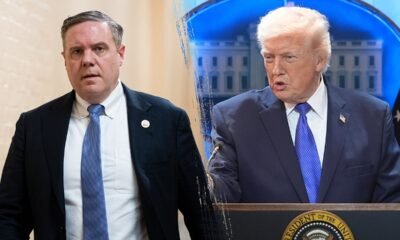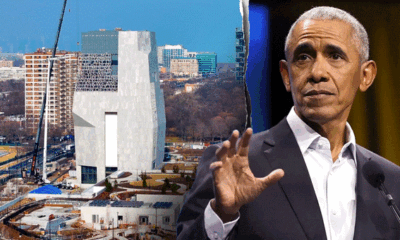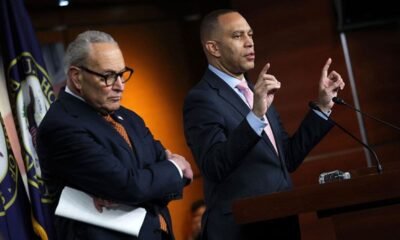INTERNACIONAL
Democratic strategist says party lacks ‘moral authority’ on Texas redistricting fight
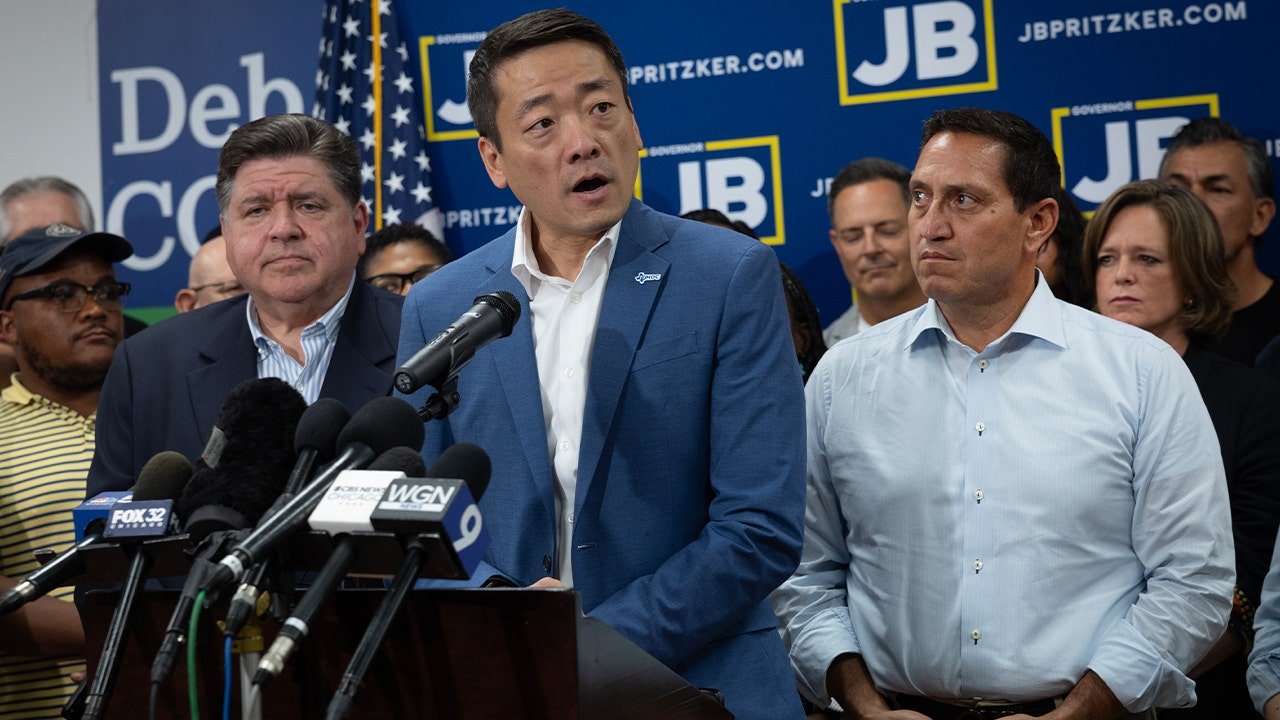
NEWYou can now listen to Fox News articles!
Democrats are fighting tooth and nail to stop Texas lawmakers’ plan to redraw the state’s congressional map, but critics, including one prominent member of their own party, say they don’t exactly hold the moral high ground.
Democrat legislators have fled the state to avoid votes on redistricting, which is expected to add more Republican seats to Congress for the Lone Star State. They’re getting the rock-star treatment as they visit blue states, where several governors have vowed to gerrymander Republicans out of their own Congressional delegations in retaliation for the Texas effort.
CALIFORNIA LAUNCHES REDISTRICTING FIGHT TO ‘NULLIFY’ TEXAS GOP PLAN, WITH DEMS POISED TO GAIN 5 SEATS
Texas state lawmakers board a bus following a press conference at the DuPage County Democratic Party headquarters on August 03, 2025 in Carol Stream, Illinois. (Scott Olson/Getty Images)
However, Democratic strategist Julian Epstein told «Fox News Live» on Saturday that his party is not immune from criticism, as many blue states have already gerrymandered in a way that limits Republican congressional representation.
«No, I think they don’t have the moral authority, and there’s a lot of pearl-clutching going on,» he said.
Several blue states, including Massachusetts, Connecticut and New Mexico, have no Republicans in their House delegations. And many feature oddly-drawn districts, seemingly crafted to limit GOP representation.
«The Democrats don’t have clean hands here. You look at states like Massachusetts, New Jersey[…] Illinois, California, and Democrats have effectively gerrymandered Republicans out of existence,» Epstein added.
NETWORKS POUNCE ON REPUBLICAN REDISTRICTING. THEY DIDN’T CARE WHEN DEMOCRATS DID IT
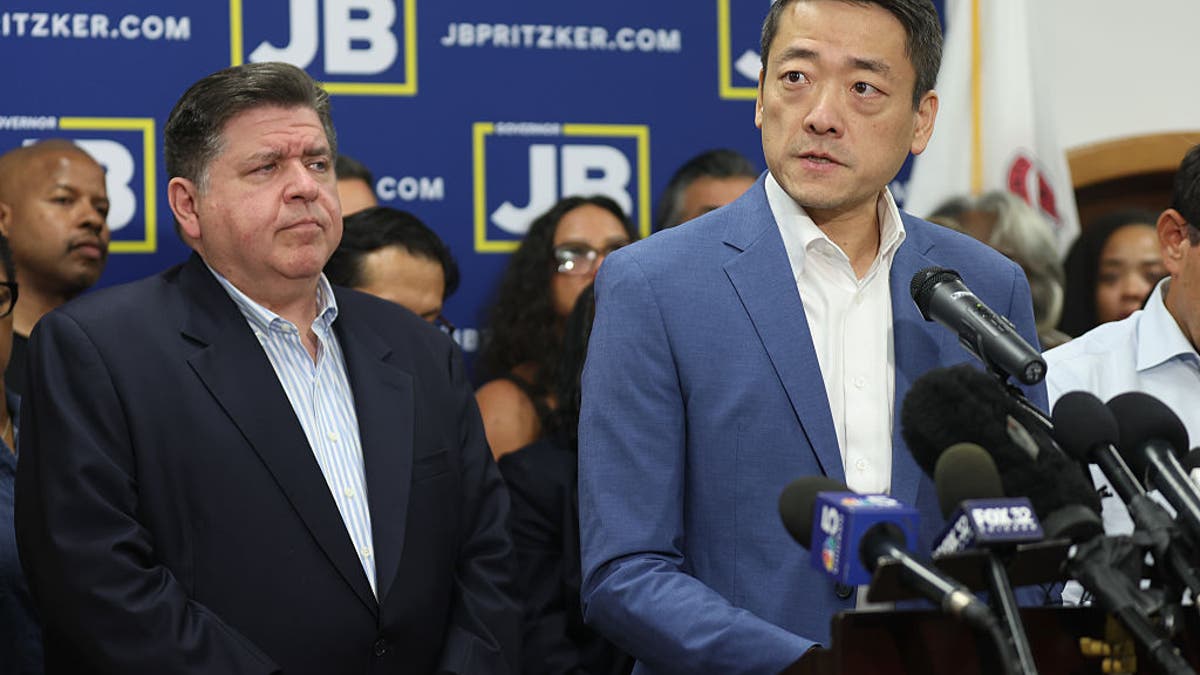
J.B. Pritzker, governor of Illinois, left, and State Representative Gene Wu, a Democrat from Texas, during a news conference at the Democratic Party of DuPage County office in Carol Stream, Illinois, US, on Sunday, Aug. 3, 2025.
Epstein cautioned that the nationwide redistricting battle could create a «race to the bottom,» and that leaving Republicans and Democrats in states led by the opposite parties could lead to people feeling left out of the democratic process. Epstein cited New Jersey, in which Trump garnered 46% of the vote in 2024, but Republicans only have three out of the 12 congressional seats.
Meanwhile, Texas state Rep. Brian Harrison, a Republican, told Fox News Digital on Saturday that Democrats are guilty of «total hypocrisy and faux outrage.»
«The dirty little secret is Democrats have no problem whatsoever with states redrawing their congressional maps to maximize partisan political advantage. They’re just furious that Republican states are starting to redraw their maps,» Harrison said.
TEXAS DEMOCRATS FLEE STATE TO BLOCK TRUMP-BACKED REDISTRICTING VOTE IN DRAMATIC LEGISLATIVE MOVE
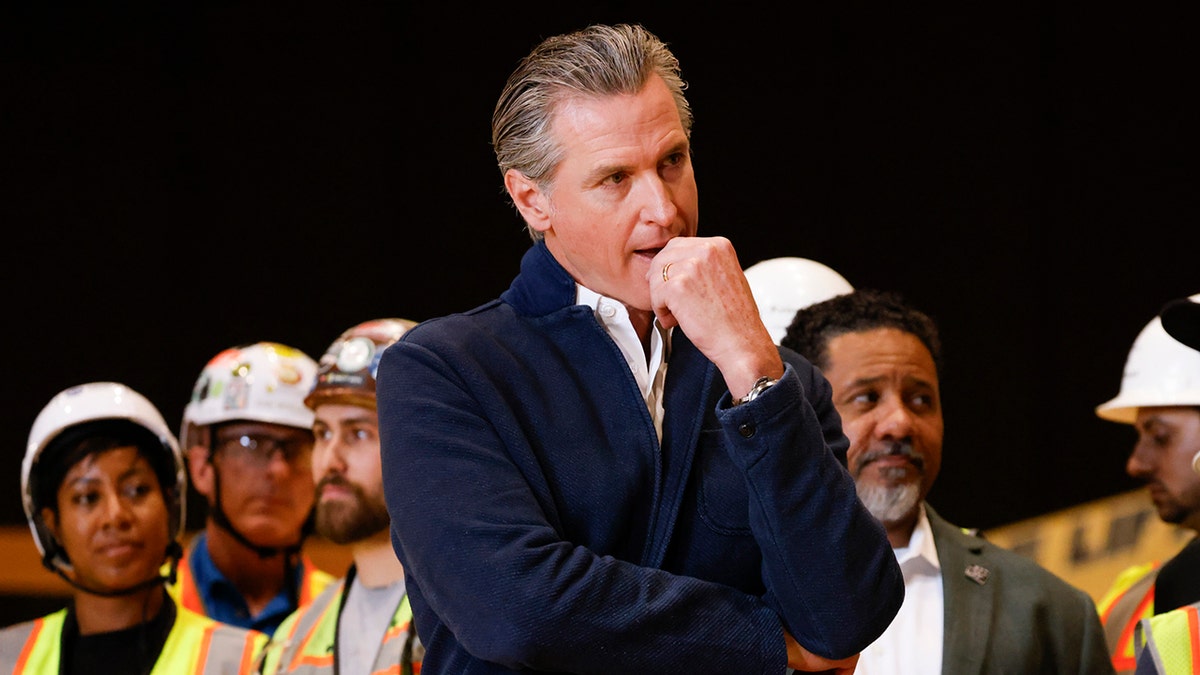
California Gov. Gavin Newsom attends a press conference, July 2, 2025 in Burbank, California. (Carlin Stiehl / Los Angeles Times via Getty Images)
«It’s because Democrat state after Democrat state, for a decade, has been gerrymandering the hell out of their congressional maps,» he said.
«Massachusetts, Connecticut, Vermont, Rhode Island, Delaware, all of these states have zero. If you’re a Republican in those Democrat states, you don’t have any voice in Congress,» he added. «And [there are] many, many more that have given you just one seat, Oregon, I think Maine and Maryland.»
In California, a special election is likely to occur in November to counteract the Texas redistricting plan.
CLICK HERE TO GET THE FOX NEWS APP
«We are talking about emergency measures to respond to what’s happening in Texas, and we will nullify what happens in Texas,» California Gov. Gavin Newsom said on Friday with some Texas state lawmakers.
«We’ll pick up five seats with the consent of the people. And that’s the difference between the approach we’re taking and the approach they’re taking,» Newsom added. «We’re doing it on a temporary basis. We’re doing it in a fully transparent way and we’re doing it by asking the people of the state of California for their consent and support.»
Harrison explained that Texas’s redistricting push has numerous reasons behind it, including the population growth in the Lone Star state since the last census.
texas,california,congress,illinois
INTERNACIONAL
US assets in Middle East positioned for ‘highly kinetic’ war, ex-Pentagon official warns

NEWYou can now listen to Fox News articles!
The U.S. is in position for a «highly kinetic» campaign against Iran after launching one of its largest recent military buildups in the Middle East, a former senior Pentagon official has claimed.
Dana Stroul, now research director at The Washington Institute for Near East Policy, made the assessment Sunday as Washington and Tehran prepare for a second round of indirect nuclear talks in Oman.
«The US military is ready for a sustained, highly kinetic campaign should President Trump order it, and also prepared to defend allies and partners in the Middle East from Iran’s missiles,» Stroul told Fox News Digital.
«The US military can rapidly reposition assets from all over the world and deploy overwhelmingly lethal force in a short period of time to one theater,» she said before highlighting how there is «no ally or enemy capable of what we have seen from the US in this current buildup.»
PRESIDENT TRUMP’S IRAN BUILDUP MIRRORS 2003 IRAQ WAR SCALE AS TENSIONS ESCALATE
The world’s largest warship, U.S. aircraft carrier USS Gerald R. Ford, on its way out of the Oslofjord at Nesodden and Bygdoy, Norway, September 17, 2025. (NTB/Lise Aserud via Reuters)
Describing how the current posture differs from the June 2025 strikes on Iranian-linked nuclear targets, Stroul said the U.S. has expanded its offensive and defensive capabilities.
«Two US aircraft carriers and their accompanying vessels and air wings were stationed in the Middle East last summer during the 12-day war and the US operation Midnight Hammer,» she explained.
«The addition of the Ford is really important, it expands US offensive capabilities if we go to war with Iran,» she said.
While in June 2025, the US carried out limited but highly targeted strikes against Iranian nuclear infrastructure to degrade key facilities without triggering a regional war, now, Stroul said the force posture is broader and more sustained.
The US has also «increased the number of guided-missile destroyers, fighter aircraft, refuelers, and air defense systems» in the region, she explained.
TRUMP SAYS IRAN HAS 15 DAYS TO REACH A DEAL OR FACE ‘UNFORTUNATE’ OUTCOME

An F/A-18F Super Hornet, assigned to Strike Fighter Squadron (VFA) 41, prepares to make an arrested landing on the flight deck of the USS Abraham Lincoln in the Pacific Ocean on Aug. 10, 2024. (U.S. Navy/Mass Communication Specialist Seaman Apprentice Daniel Kimmelman/Reuters)
The deployment of aircraft carriers such as the USS Gerald R. Ford and USS Abraham Lincoln has assumed heightened strategic importance.
The USS Gerald R. Ford was recently tracked transiting the Strait of Gibraltar eastward, while the USS Abraham Lincoln is operating in the Arabian Sea.
«They will both be in the Middle East CENTCOM theater,» Stroul explained before clarifying that there could be «one in the eastern Mediterranean and the other in the Arabian Gulf.»
«There would probably be a combination of reasons for that based on availability, readiness, proximity to the Middle East.
«The Ford was heading home and directed to turn around,» she added.
While the specific destinations of the carriers have not been publicly disclosed for operational security reasons, their presence alone signals escalatory leverage and deterrence.
WITKOFF WARNS IRAN IS ‘A WEEK AWAY’ FROM ‘BOMB-MAKING MATERIAL’ AS TRUMP WEIGHS ACTION

Omani Foreign Minister Sayyid Badr Hamad Al Busaidi, US President Donald Trump’s Special Representative for the Middle East, Steve Witkoff and U.S. negotiator Jared Kushner meet ahead of the US-Iran talks, in Muscat, the capital of Oman, on February 06, 2026. (f Oman, on FebruarOman Foreign Ministry/Anadolu via Getty Images)
The military buildup comes as indirect diplomatic talks between Washington and Tehran continue, with Oman once again serving as a mediator Feb. 26.
Stroul argued that Iran’s leadership is trying to balance brinkmanship with negotiation.
«Iran’s leaders are playing a weak hand by combining saber-rattling about their own capabilities, staging preparations and exercises to signal readiness,» she claimed.
«They are attempting to slow this down by pursuing negotiations. No one should be under any illusions about the reality of US dominance — Iran is completely outmatched in conventional terms,» Stroul said.
BUILT FOR WEEKS OF WAR: INSIDE THE FIREPOWER THE US HAS POSITIONED IN THE MIDDLE EAST

Armed NOPO special police units are on the scene as Iranians take to the streets in the downtown Enghelab (Revolution) Square in Tehran, Iran on June 24, 2025, to celebrate the ceasefire after a 12-day war with Israel. (NEGAR/Middle East Images/AFP via Getty Images)
«Israel dominated Iranian airspace in one day last year, targeted many of Iran’s security leaders, took out half of its missile arsenal, and the US significantly set back its nuclear program,» Stroul said.
Iran’s long-cultivated network of proxies across the region — including Hezbollah, Shiite militias in Iraq, and elements in Syria — has also been weakened after sustained Israeli military pressure.
«Iran’s long-cultivated network of proxies across the region is degraded after more than two years of Israeli operations, and they declined to enter the war and support Iran’s defense last summer,» Stroul explained.
CLICK HERE TO DOWNLOAD THE FOX NEWS APP
«No matter what Iran’s leaders say, Iran is not able to rebuild a decades-long project in a few months.»
«That said, the US military is in a position to execute whatever orders President Trump gives,» she said. «It is not a question of military readiness, but a political decision.»
iran,middle east,wars,donald trump,ali khamenei,pentagon defense,pentagon,us navy,military
INTERNACIONAL
¿Cuál es el argumento para creer en Dios?

La larga y sinuosa ruta de Christopher Beha desde un ateísmo bien fundamentado hasta una fe cristiana aún más cultivada comienza con una imagen poderosa: un ángel se le aparece. No es Clarence, el atolondrado amigo de Jimmy Stewart en ¡Qué bello es vivir!, sino una aparición exigente y persistente.
En su profunda reflexión sobre la fe y la filosofía, Why I Am Not an Atheist (Por qué no soy ateo), explica que el espíritu le dijo que confiara en Dios. “Esto no fue un sueño”, escribe sobre la primera visita, ocurrida a mediados de los años noventa, cuando tenía 15 años. “Estaba despierto —tan seguro de eso como de que ahora estoy despierto mientras escribo estas palabras— y una presencia aterradora se comunicaba conmigo”.
Las visitas continuaron durante años. Beha creció en una familia católica y amante de los libros en el Upper East Side de Nueva York, que lo envió a Princeton. Fue editor de Harper’s Magazine y es autor de cuatro libros anteriores, cuyos temas abarcan desde novelas sobre complicaciones emocionales hasta un repaso por los clásicos, mostrando así su versatilidad literaria.

Unos años después de que el imperioso querubín le indicara que debía acercarse a Dios, Beha comprendió que todo podía explicarse desde la ciencia. Había experimentado parálisis del sueño, un estado en el que permanecía despierto pero inmovilizado, acompañado de alucinaciones.
“Había sufrido un padecimiento físico bastante común y, en vez de buscar una causa racional, me refugié en la superstición”, escribe. “En realidad me había convencido de que Dios me enviaba un mensaje”.
Como alguien que también presenció algo inexplicable (una santa fallecida que abrió los ojos en una cripta en Italia), me resultaba más atractivo el Beha adolescente, colmado de asombro religioso. Pero al final del libro, regresa al ángel con una visión ampliada. Fue a la vez un milagro y algo real. “Sé lo que ‘causó’ esas visitas, desde un punto de vista material, pero también sé lo que provocaron después: un viaje de toda la vida en el que todavía sigo”.
Entre esos extremos se despliegan varios cientos de páginas que componen ese trayecto, casi todas centradas en los filósofos mayoritariamente ateos del canon occidental. No es una peregrinación tradicional, sino una odisea intelectual. Beha debate con los grandes maestros: Descartes, Kant, Locke, Mill, Hobbes, Camus, Nietzsche y muchos más, pero empieza cuestionando a los “nuevos ateos” como Sam Harris, Richard Dawkins, Christopher Hitchens y similares, a quienes considera ya superados.

Hace algunos años, el periodista Michael Kinsley describió el libro de Hitchens God Is Not Great con una frase memorable: “Hitchens es un ateo de aldea a la antigua, parado en la plaza tratando de discutir con los buenos ciudadanos que van camino a la iglesia”.
Beha no es de los que lanzan piedras ni busca peleas. Tiene una devoción casi obsesiva por las grandes mentes. Es el tipo de persona que habrías querido como compañero de habitación antes de la era de la inteligencia artificial. O tal vez no. Ha leído todo y hasta escribió una memoria al respecto, The Whole Five Feet, en la que narra el año que dedicó a leer los 51 volúmenes de los Harvard Classics. Solo mirar esa lista agota a la mayoría.
Él escaló esa montaña para que otros no tuvieran que hacerlo. Pero, a veces, en su nuevo libro se pierde en las nubes. Un ejemplo, al tratar a Immanuel Kant, el filósofo alemán: “Kant aquí invoca dos binarios que ya hemos discutido. El primero es el que existe entre la verdad a priori y a posteriori; el segundo, entre análisis y síntesis”.
Beha es sincero, honesto y resulta agradable en la página. Su historia personal resulta más interesante que la intelectual. Empezó a dudar de su fe a los 18 años, tras casi perder a su hermano gemelo en un accidente de auto. Sufrió depresión y un cáncer que puso su vida en riesgo, abusó del alcohol y las drogas. Fue ateo durante mucho tiempo.

El libro es una larga réplica a “Why I Am Not a Christian”, el célebre ensayo del polímata británico Bertrand Russell, quien calificaba la creencia en Dios como “una concepción indigna de hombres libres”. Russell fue una de las figuras que empujaron a Beha a años de escepticismo comprometido.
No le resultaba suficiente el agnosticismo tibio de los espiritualmente errantes, una condición que el comediante católico Stephen Colbert comparó alguna vez con ser “un ateo sin agallas”. Beha se entregó por completo.
El argumento de Russell es conciso, refuta cada una de las razones principales a favor de la fe. El de Beha no lo es. Descompone la visión atea en dos categorías y dedica la mayor parte del libro a detallarlas e incluso simpatizar con ellas. Una es el “materialismo científico”, que sostiene que solo existe el mundo material. La otra es el “idealismo romántico”, que él define como la creación de la propia realidad.
Durante sus largos años en el desierto de la incredulidad, Beha intentó encajar en alguna de esas narrativas, buscando “hacer significativa una vida sin Dios”.

Al final, el ateísmo le resultó insuficiente, igual que a algunos revolucionarios franceses que transformaron brevemente la catedral de Notre-Dame en el árido Templo de la Razón. La religión de la no-religión puede parecerse a la cerveza sin alcohol: ¿para qué?
Beha no pretende convencer a quienes ya han renunciado a Dios. Solo quiere explicar qué lo llevó a regresar a la fe de sus padres, “escuchando la voz susurrante en el alma”. No hay una conversión fulminante, ninguna luz cegadora. Más bien, su vida, a menudo miserable, mejora con la mujer adecuada, una confesión católica, la asistencia regular a misa. Y esa mujer —“ella era la razón por la que creía en Dios”— ni siquiera es creyente. Es episcopaliana no practicante.
Si Beha no logra necesariamente ganar su debate con Russell, al menos hay que reconocerle que cumple la exigencia de los seres conscientes: reflexionar a fondo sobre el misterio de lo que somos en un universo incognoscible.
“No creo que alguna vez vea las cosas con claridad; no en esta vida mortal”, concluye. “Lo mejor que podemos esperar es estar mirando en la dirección correcta, orientados del modo adecuado”.
Fuente: The New York Times
INTERNACIONAL
Narcotráfico en México: seis carteles poderosos y 480.000 asesinatos en 20 años

1.- Cartel de Sinaloa:
2.- Cartel Jalisco Nueva Generación:
3.- Cartel del Golfo:
4.- Cartel del Noroeste:
5.- La Nueva Familia Michoacana:
6.- Carteles Unidos:

 ECONOMIA2 días ago
ECONOMIA2 días agoVillarruel cuestionó la apertura de importaciones: «Sin industria, se pasa a depender de China»

 POLITICA1 día ago
POLITICA1 día ago“Ahora es la hora de jugarse”: el mensaje de Patricia Bullrich a los empresarios tras aprobarse la reforma laboral

 ECONOMIA1 día ago
ECONOMIA1 día agoSegún un especialista, el precio de la carne se mantendrá alto “entre dos y tres años”



